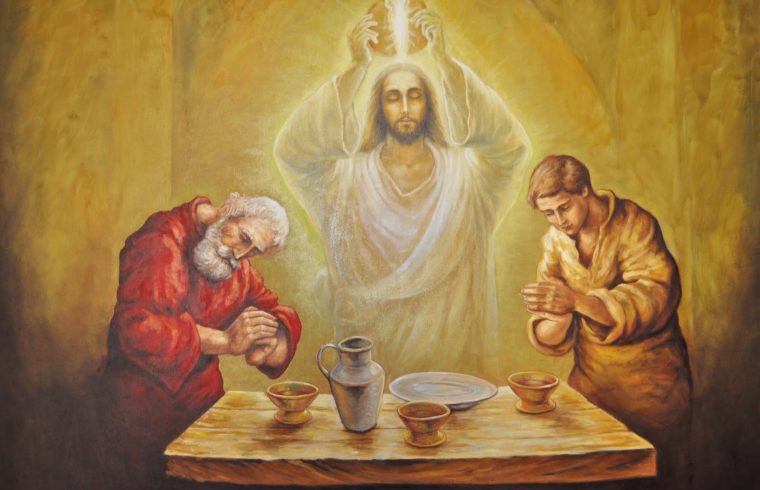The New Covenant of Jesus Christ:
This coming day would bring forgiveness of sin, internal renewal of the heart, and intimate knowledge of God. On the night of Jesus’ Last Supper, Jesus takes the cup and declares that his death would be the inauguration of this new covenant.
DEFINITIONS MATTER…
Do definitions matter? Hand out a sheet of paper to a hundred Christians and ask them what their definition of the new covenant is. You are likely to get close to that many different answers, and that is from those who even attempt an answer. Ask a hundred theologians to define the new covenant, and you will likely get a much higher percentage who attempt an answer, but nearly the same percentage of disparity in their answers. Some books written about the covenants do not even attempt to define the new covenant; the authors apparently assume their readers know what the new covenant is. Do you know what it is? Before you proceed further, why not grab a sheet of paper and write down your own definition of the new covenant. Most books on the covenants focus primarily on the old and new covenants. A vast majority of scholars agree that the old covenant is the covenant made with Israel at Sinai, together with its law. But when it comes to defining the new covenant, it seems as though most Christians are nonplussed. Those who do attempt a definition generally include references to one or more of the following: Jesus, His death and resurrection, the gospel, grace, love, the Holy Spirit, the law written on the heart, and so forth. Some define the new covenant in terms of how it is different from the Sinai covenant and its laws, i.e., defining it in terms of what it is not rather than to what it is. Our lesson this week focuses on a two-dimensional definition of the new covenant. We cannot decode the covenants without understanding both dimensions.

THE NEW COVENANT
If only God Himself had given a clear, straightforward definition of the new covenant. Oh, but wait, He did! In the inscribe verses for this week, God Himself defines the new covenant! No equivocation, no ambiguity, no obscurity; just a straightforward definition that most anyone could understand. But before we get to the definition proper, here is a brief back-story. God first announced and defined the new covenant in the Old Testament through Jeremiah (Jer. 31:33, 34). Hebrews in the New Testament picked it up straight from Jeremiah. In the longest New Testament quotation of an Old Testament passage, Hebrews 8:7–12 quotes Jeremiah 31:31–34, essentially verbatim. God defines the “new covenant” (Heb. 8:8) as four promises He makes to His people.
The New Covenant
Promise 1: He promises that He will write His laws in their hearts (Heb 8:10), to sanctify them, to make them holy, aligning their hearts and characters with His. When God gave Israel His law at Sinai, the people immediately responded, “All the words which the LORD has said we will do, . . . and be obedient” (Exod. 24:3, 7, NKJV), as in, “We’re good, God; we got this.” But they weren’t good, not that good; and they hadn’t “got this” (recall the golden-calf incident at this point!). He wants them to know that He didn’t give them His law to challenge them to try and keep it. “He knows our frame; He remembers that we are dust” (Ps. 103:14, NKJV). He gave it to them as a promise of the kind of people He would make of them if they would rely on Him and trust Him. “I will give you a new heart and put a new spirit within you . . . and cause you to walk in My statutes” (Ezek. 36:26, 27, NKJV).
Promise 2: He promises to be their God and make them His people (Heb. 8:10) to reconcile them to Himself. Isaiah warned, “Your iniquities have separated you from your God” (59:2, NKJV), the most vulnerable condition possible for people living in a hostile environment such as our world. God says, “I want to be your shield and refuge. Rely on Me, trust Me; let Me do my thing on your behalf.” God would reconcile us through Christ’s death on the cross (2 Cor. 5:17–21).
Promise 3: God promises to reveal Himself to the whole world, and He promises that the day is coming when that will not be necessary anymore, because everyone will know Him, from the least to the greatest (Heb. 8:11)—the harmony of Eden will be restored. Until that day of final consummation, He invites those who already know Him to team up with Him and other believers in His mission to make Himself known within their own circles of influence (Matt. 28:19, 20).
Promise 4: God promises to forgive our sins and remember them no more (Heb. 8:12), in order to justify us so that we stand before God as though we had never sinned. At some point in human history, the Covenant Maker Himself came from heaven to earth to shed His “blood of the everlasting covenant” to make this possible and to make it hard to resist. These four promises shout out that God has made sure anyone who really wants to be in His eternal kingdom can be, because He has committed Himself and all of His resources to make it happen! God Himself defines the new covenant by these four promises; they are the DNA of the new covenant. In short, the new covenant is the gospel! Why don’t more Christians already know this? God couldn’t have made it plainer. Could it be that some sinister force is at work to dull people’s minds and veil their hearts to the gospel lest people hear it, understand it, believe it, walk in it, and receive the full inheritance prepared for them from the creation of the world?
THE EXPERIENTIAL DIMENSION OF THE COVENANTS
In the preface to God’s definition of the new covenant, He says: “If that first covenant had been faultless” (Heb. 8:7, NKJV), there would have need no need for a new covenant. So what was so “faulty” (“wrong” NIV) with the first covenant that required a new one? Surprisingly, God does not list things here like a weak human priesthood or animal sacrifices that could not accomplish forgiveness, and so forth, or anything at all that directly pertains to the covenant itself which He made with His people. Rather, He explicitly explains where the fault lies: “Finding fault with them . . . I will make a new covenant . . . —because they did not continue in My covenant, and I disregarded them, says the LORD” (vv. 8, 9, NKJV, emphasis supplied).
Here, in straightforward, unambiguous language, God instructs us that when He thinks of covenant, and when Scripture speaks about covenant, He includes how people respond to the promises and appeals He made through the covenants as well. Furthermore, He refers to the three types of covenants covered from last week: the archetypal everlasting covenant and its origin in the nature of the Trinity;
its adaptation in the covenant of grace designed to redeem humanity from the pandemic of sin; and to the historical covenants’ progressive unveiling of the full gospel throughout history.
There are historical old and new covenants and there are experiential old and new covenants. Just as surely as there are a series of historical old covenants (with Adam, Abraham, Israel, and so on) and a historical new covenant (initiated when Jesus came in history), so too are there experiential old and new covenants depending on how people respond to the gospel promises and appeals God made and makes through His historical covenants. The secret to decoding the covenant(s) includes understanding the gospel promises as they are revealed in the historical covenants and the responses of the people to those promises.
An experiential old covenant may be defined as responding to the gospel by rejecting it outright or by accepting it outwardly only, complying with it legalistically to gain heaven and escape hell. It represents an unconverted life. An experiential new covenant is defined as responding to the gospel internally, from the heart, by faith in, and reliance on, the promises of God, resulting in an obedience that issues naturally through the indwelling of the Holy Spirit, who writes God’s law on one’s heart. Paul describes his life before conversion as a life of “confidence in the flesh” (Phil. 3:3), religious to the hilt, obedient to the law from childhood up, confident that concerning a “righteousness, which is in the law [he was] blameless” (v. 6, NKJV; “faultless” in NIV). Though he was living in the new covenant historical era, he had an old covenant experience. After his conversion to Jesus, he considered his previous obedience “as rubbish” (NKJV) and accepted a new “righteousness . . . through faith in Christ, the righteousness that comes from God on the basis of faith” (vv. 8, 9, NIV)—a new covenant experience. To think of the old and new covenants as experiences in other than exclusively historical terms will be a new skill for many of us. But God Himself pointed us in this direction when He said He would not have needed a new covenant had He not found fault with the people because they failed to “continue in My covenant” (Heb. 8:9, NKJV). Their response to His covenant had resulted in an old covenant experience without hope. He responded with a new covenant, appealing for a new covenant response and a new covenant experience in which they would fully, faithfully, obediently embrace the inheritance He had prepared for them from the beginning of the world.

The New Covenant of Jesus Christ:
In His preface to and definition of the new covenant, Jesus shares the deepest longings of His heart for every person on the planet to be with Him forever. He envisions a day when everyone on earth, “from the least of them to the greatest” (Heb. 8:11, NKJV), will truly know Him, not just in terms of facts but in a personal and intimate way. This is part of His third new covenant promise and revelation about Himself. They will know Him:
- Knowing how much He loves them, that He is crazy about them, and that He feels deeply when they aren’t happy.
- Knowing Him as someone they can trust, always there for them even when they cannot sense it.
- Knowing Him as the One with whom they can share their deepest thoughts, feelings, frustrations, discouragements, joys, and everything else, believing that He cares about it all and wants to be involved.
- Knowing Him as someone they desire to have involved in every aspect of their lives—at home, at school, at work, in their relationships, wherever, in whatever, and with whoever they are involved.
- Knowing Him as their very best friend, going to bed and waking up thinking about Him.
The New Covenant of Jesus Christ:
For real, deep-down knowing Him. But also desiring to know Him at deeper levels still. It involves desiring to hang out with people who also love Him and know Him, sharing experiences with Jesus, insights into who He is based on the study of the Bible, the writings of Ellen White, and other spiritual resources, and discussing questions about Him. It is knowing Jesus at such a deep level that one’s greatest excitement is sharing Him with acquaintances who don’t yet know Him or who know about Him but do not really know Him at a level that brings them joy, hope, and a purpose to live for every day. Jesus longs for the day when everyone will know Him at that level, “from the least of them to the greatest”—from the homeless orphan picking through the garbage dump to find food for the day to the influential power broker who dines sumptuously every day and never gives a dime to charity. Jesus’ new covenant promises assure that everyone who does not resist the continual drawing of the Holy Spirit on their hearts will be drawn to Jesus through repentance and faith, be reconciled to God, forgiven of their sins, and
sanctified through the writing of His law on their hearts, resulting in an “obedience that comes from faith” (Rom. 1:5, NIV). He wants no one to be left out of the potentiality and the hope offered to them in His new covenant.
COMMUNION WITH THE INFINITE ONE
“I will pour water upon him that is thirsty, and floods upon the dry ground.’ Isaiah 44:3. Those who hunger and thirst after righteousness, who long after God, may be sure that they will be filled. The heart must be open to the Spirit’s influence, or God’s blessing cannot be received. . . . “We are so erring and short-sighted that we sometimes ask for things that would not be a blessing to us, and our heavenly Father in love answers our prayers by giving us that which will be for our highest good—that which we ourselves would desire if with vision divinely enlightened we could see all things as they really are. When our prayers seem not to be answered, we are to cling to the promise; for the time of answering will surely come, and we shall receive the blessing we need most. . . . Thendo not fear to trust Him, even though you do not see the immediate answer to your prayers. Rely upon is sure promise, ‘Ask, and it shall be given you.’ . . . “Through sincere prayer we are brought into connection with the mind of the Infinite.
COMMUNION WITH THE INFINITE ONE
We may have no remarkable evidence at the time that the face of our Redeemer is bending over us in compassion and love, but this is even so. We may not feel His visible touch, but His hand is upon us in love and pitying tenderness. . . . “A closet of communion may be found wherever we are. We should have the door of the heart open continually and our invitation going up that Jesus may come and abide as a heavenly guest in the soul. . . . “Keep your wants, your joys, your sorrows, your cares, and your fears before God. You cannot burden Him; you cannot weary Him. He who numbers the hairs of your head is not indifferent to the wants of His children. ‘The Lord is very pitiful, and of tender mercy.’ James 5:11. His heart of love is touched by our sorrows and even by our utterances of them. Take to Him everything that perplexes the mind. Nothing is too great for Him to bear, for He holds up worlds, He rules over all the affairs of the universe. Nothing that in any way concerns our peace is too small for Him to notice. There is no chapter in our experience too dark for Him to read; there is no perplexity too difficult for Him to unravel. No calamity can befall the least of His children, no anxiety harass the soul, no joy cheer, no sincere prayer escape the lips, of which our heavenly Father is unobservant, or in which He takes no immediate interest. ‘He healeth the broken in heart, and bindeth up their wounds.’ Psalm 147:3. The relations between God and each soul are as distinct and full as though there were not another soul upon the earth to share His watchcare, not another soul for whom He gave His beloved Son. . . . “We should keep in our thoughts every blessing we receive from God, and when we realize His great love we should be willing to trust everything to the hand that was nailed to the cross for us.”d to the cross for us.”


ICB
The International Christian Board (ICB) is described as a consulate, an office of God’s Consul. This Socio Devotional mission is usually subordinate to God’s main representation in the capital of all countries, typically an embassy.
Contact Us
- ICB, Hyderabad, Telangana, India
- Email: contact@icb.com
- Phone: +12345678900
By UPI
If you wish to pay by UPI


